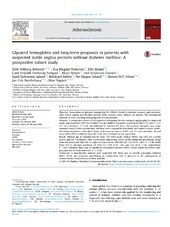Glycated hemoglobin and long-term prognosis in patients with suspected stable angina pectoris without diabetes mellitus: A prospective cohort study
Rebnord, Eirik Wilberg; Pedersen, Eva Kristine Ringdal; Strand, Elin; Svingen, Gard Frodahl Tveitevåg; Meyer, Klaus; Schartum-Hansen, Hall; Løland, Kjetil Halvorsen; Seifert, Reinhard; Ueland, Per Magne; Nilsen, Dennis W. T.; Nordrehaug, Jan Erik; Nygård, Ottar
Peer reviewed, Journal article
Published version
Date
2015-05Metadata
Show full item recordCollections
Original version
https://doi.org/10.1016/j.atherosclerosis.2015.02.053Abstract
Objective: Associations of glycated hemoglobin A1c (HbA1c) levels to incident coronary and cardiovascular events among non-diabetic patients with coronary artery disease are unclear. We investigated relations of HbA1c to long-term prognosis in such patients. Methods: A prospective cohort of 2519 patients undergoing elective coronary angiography for suspected stable angina pectoris (SAP) was divided into pre-defined categories according to HbA1c (%) levels (<5.0, 5.0-5.6 (reference), 5.7-6.4), and followed for median 4.9 years. The primary end-point was major coronary events (including non-fatal and fatal acute myocardial infarctions, and sudden cardiac death). Secondary end-points were death from cardiovascular disease (CVD) and all-cause mortality. Hazard ratios (HRs) (95% confidence intervals [CIs]) were obtained by Cox regression. Results: Median age at inclusion was 62 years, 73% were males, median HbA1c was 5.6% and random plasma-glucose 5.4 mmol/L. After multivariate adjustment, HbA1c levels within the pre-diabetic range were not associated with risk of major coronary events, HR (95% CI): 1.13 (0.79-1.62); P = 0.49, death from CVD or all-cause mortality HR (95% CI): 0.95 (0.55-1.66) and 1.04 (0.70-1.53), respectively; P ≥ 0.85. Similarly, there was no significant association between HbA1c values within the lowest category and risk of study outcomes, (P ≥ 0.18). Conclusion: In non-diabetic patients with suspected SAP, there was no overall association between HbA1c levels and prognosis, questioning an independent role of glycemia in the pathogenesis of atherosclerotic complications in these patients.

